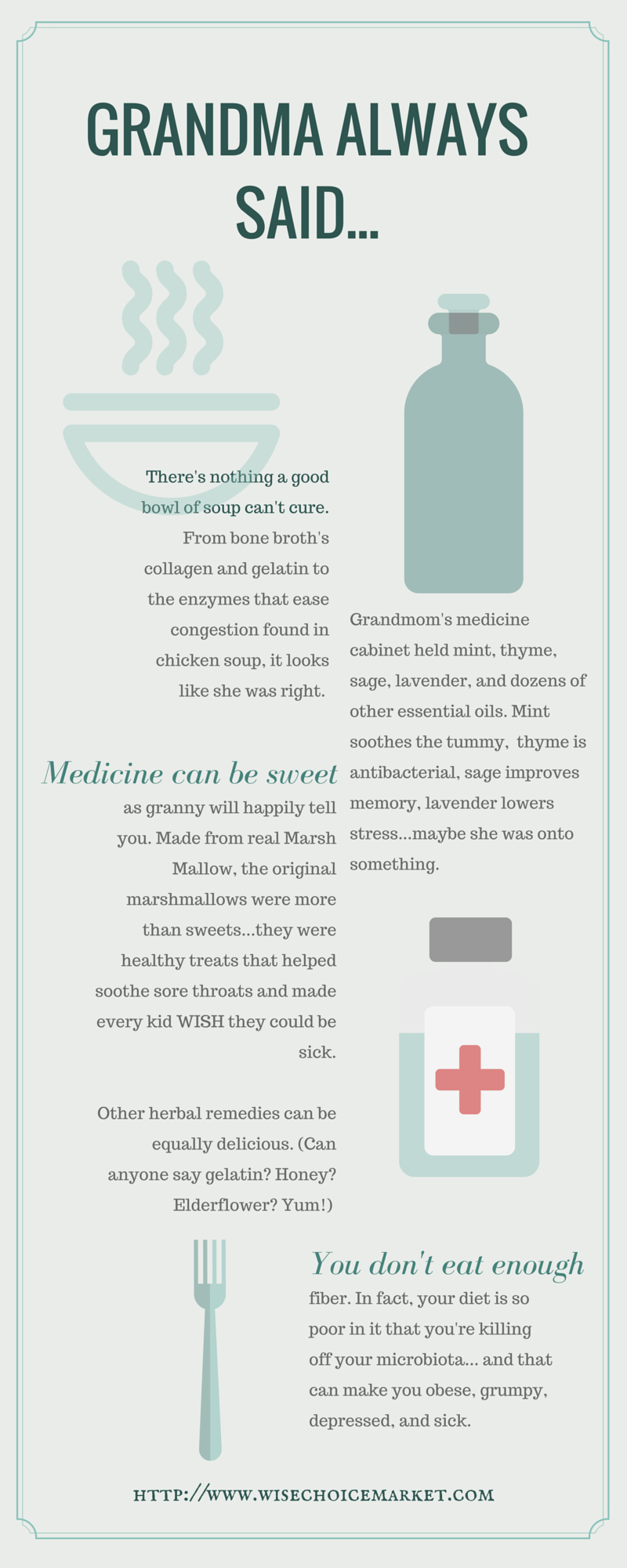Blog Categories
Recent Posts
- Home
- Whole Foods, Essential Oils, and More of Granny’s Nutritional Guidelines
Whole Foods, Essential Oils, and More of Granny’s Nutritional Guidelines
Posted by on
Chances are that your grandmother already forgot more about healthy living than you'll ever learn. From whole foods to essential oils, her nutrition tips are priceless wisdom. In this article, we're taking a deeper look at her advice...

What Makes Soup so Special?
From bone broth to chicken soup, liquid nutrition is a hot topic these days. You're probably well aware of the benefits a good, meaty bone broth provides. Did you know that fish broth is an even more powerful source of nutrition? Loaded with healthy fats, minerals, and vitamins, it's often touted as a cure-all.
Even if you're no fish fan, there's a broth-based treat you grew up eating that's the perfect meal to help you get over colds, flu, and even the occasional sinus or throat infection. Nutrition tips for these infections might mention it in passing, but it deserves a little love. Chicken soup contains enzymes that make it easier for you to breathe by breaking down the congestion that's killing you. The soup also stimulates appetite, and if your grandmother's recipe is anything like mine, it contains beta carotene-loaded carrots, vitamin and mineral rich onions and garlic, and tummy-soothing parsley.
Should You Really Keep Essential Oils in The Medicine Cabinet?
My grandmother smelled like peppermint and lavender. The essential oils she used did more than help her smell good, though. They cut stress and kept her feeling her best. Herbal remedies were the only type of medicine available for centuries, and they're still in use today. Essential oils offer a wide array of benefits, are inexpensive, and they smell good. What more could you want?
Don't jump into using essential oils without a little help, however. These potent natural therapeuticals can have some nasty side effects if used incorrectly. Dr. Mercola's site offers a great list of herbal essential oils 1 that shows you the uses and benefits for numerous essential oils. It's not an exhaustive list, but it's a great place to get started.
Are All Sweets Bad for You?
Sugar is addictive, bad for your teeth, and the best friend of diabetes. Aspartame...we won't even go there. But are all sweets bad for you? Grandma would say no. From the allergy-fighting benefits of local honey (nature's allergy shots) to old-fashioned marshmallows, sometimes indulging your sweet tooth can be a good thing. The main problem with sweets in our modern diet is tied to how they are made. We took healthy, natural treats and made them easier for machines to produce, but we ignored the impact that had on our health.
Modern candies are made with artificial colors and flavors that can alter behavior and provoke allergic reactions, and they rely on highly refined sweeteners like high fructose corn syrup and refined sugar. If you indulge in moderation, make smart choices about what sweets you eat, and stick to natural options, candy and treats don't have to disappear from your life. Fruit, homemade marshmallows (with real marsh mallow), and homemade cocoa are a few good places to start experimenting with sweets that are better for you. There's a great recipe for old-fashioned marshmallows 2 on Learning Herbs that I love!
Do You Need to Eat More Fiber?
According to Stanford researchers Justin and Erica Sonnenburg, the modern Western diet includes roughly 15 grams of fiber daily. That's nowhere near enough. The Hadzu people of Africa's Rift Valley, the world's last true hunter-gatherers, consume closer to 150 grams of fiber each day. It makes a big difference on your gut health, too. When the gut microbiota is low on fiber, researchers are discovering that it begins to consume the mucus of its host's intentions. That's you.
A little more fiber can go a long way towards making your body healthier. Of course, if you prefer to be a microbe's dinner 3, feel free. As for me, I'll be eating the amount of daily fiber the Sonnenburgs recommend:
1-3 year old children: 19 grams
4-8 year olds: 25 grams
9-13 year olds: 26 grams (girls), 31 grams (boys)
14-18 year olds: 26 grams (girls), 38 grams (boys)
19-50 year olds: 25 grams (women), 38 grams (men)
51+ year olds: 21 grams (women), 30 grams (men)
Pregnant women: 28 grams
Lactating women: 29 grams
Of course, whole foods are one of the best sources of dietary fiber. From blueberries to jicama, nature provides plenty of flavor options, too.
What's one thing your grandmother taught you about living healthy? When you share this post on Facebook, Google+, and Pinterest, don't forget to include your own grandmother's nutrition tips, too!
References:
1. http://articles.mercola.com/herbal-oils.aspx
2. http://learningherbs.com/remedies-recipes/how-to-make-marshmallows/
3. http://www.scientificamerican.com/article/fiber-famished-gut-microbes-linked-to-poor-health1/
Information provided in this communication is not designed to and does not provide medical advice, professional diagnosis, opinion, treatment or services to you or to any other individual. This is general information for educational purposes only. The information provided is not a substitute for medical or professional care, and you should not use the information in place of a visit, call consultation or the advice of your physician or other healthcare provider. Wise Choice Marketing Inc is not liable or responsible for any advice, course of treatment, diagnosis or any other information, services or product you obtain through Wise Choice Marketing Inc.


 Loading... Please wait...
Loading... Please wait...













